|
|
|
Sort Order |
|
|
|
Items / Page
|
|
|
|
|
|
|
| Srl | Item |
| 1 |
ID:
178164
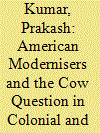

|
|
|
|
|
| Summary/Abstract |
The cattle modernisation sought by American missionaries in colonial North India advanced a productivist argument around the efficiency of cattle and their contribution to agriculture. On the face of it, by criticising the excessive supply of cattle in North India, this position went against the core preservationist concerns of the cow protectionists. But in reality, these modernisers struck a range of correlations with colonial and nationalist positions on the management of livestock and, ironically, even some limited space with the cow protectionists in treating India’s cattle as productive beings that were beneficial to the nation. These American prescriptions were stable constructs that became visible once again in the American food aid apparatus in India after Independence and shared overlapping concerns with ongoing cattle productivity debates in India. This paper illuminates the overlaps between the advocacy of the multiple constituents and a recurrence of certain patterns of contestation that were constitutive of the very paradigm of agrarian modernisation.
|
|
|
|
|
|
|
|
|
|
|
|
|
|
|
|
| 2 |
ID:
148619
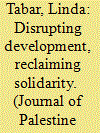

|
|
|
|
|
| Summary/Abstract |
Originally developed for the Center for Development Studies at Birzeit University in 2011, this paper examines the humanitarian assistance that flooded the occupied Palestinian territories after the beginning of the second intifada (2000–2005). It provides a critical analysis of the international development aid that was directed at Palestinians in the West Bank and Gaza Strip, where the Oslo process was territorialized, to the exclusion of the vast majority of the Palestinian people. Today, Palestinians are challenging the dominant development discourse and neoliberal economic model set in place by the Oslo Accords, wherein development recast Israeli settler colonialism as an externality, which the putative Palestinian state-building project would transcend. Returning to Yusif Sayigh's view that development cannot occur under settler colonialism, Palestinians are articulating alternatives to the Oslo post-conflict paradigm that emphasize self-reliance and resistance. The discussion that follows situates itself as a contribution to this process by interrogating the anti-political bias of humanitarianism and charting how indigenous Palestinians are building alternatives to food aid.
|
|
|
|
|
|
|
|
|
|
|
|
|
|
|
|
| 3 |
ID:
124585
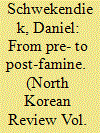

|
|
|
|
|
| Publication |
2013.
|
| Summary/Abstract |
Purpose-In the 1990s, North Korea experienced a national crisis that evolved into a famine. This paper explores the trends in underweight among preschool children measured from the pre- to the post-famine period.
Design-This research employs nutrition surveys carried out in North Korea in 1987, 1997, 1998, 2000, 2002, 2004, 2009 and 2012.
Findings-This paper shows that the country now has reached a pre-crisis level, indicating that children today are faring as well as they were during the Cold War. However, underweight rates are 24 times higher in North Korea compared to South Korea. More important, the UN targets an underweight rate of 9 percent in East Asia, but the rate is as high as 15 percent in North Korea, implying that further efforts are needed.
Originality-This paper provides rare evidence on the long-term trend in underweight among North Korean children. This is also the first paper that compares underweight rates of contemporary North Korean children with their South Korean peers.
|
|
|
|
|
|
|
|
|
|
|
|
|
|
|
|
| 4 |
ID:
082935
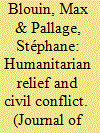

|
|
|
|
|
| Publication |
2008.
|
| Summary/Abstract |
The authors examine the effects that famine relief efforts (food aid) can have in regions undergoing civil war. In the model, warlords seize a fraction of all aid entering the region. How much they can loot affects their choice of army size; therefore the manner in which aid is delivered influences warfare. The authors identify a delivery plan for aid that minimizes total recruitment in equilibrium
|
|
|
|
|
|
|
|
|
|
|
|
|
|
|
|
| 5 |
ID:
139474
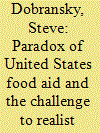

|
|
|
|
|
| Summary/Abstract |
This article analyzes United States food aid from 1981-2009, examining the primary donor motivations and the overall effects on the recipients.
|
|
|
|
|
|
|
|
|
|
|
|
|
|
|
|
| 6 |
ID:
083823


|
|
|
|
|
| Publication |
2008.
|
| Summary/Abstract |
The current global agreement governing food aid-the Food Aid Convention (FAC)-has been subject to annual renewals since it expired in 2002. Critics have pointed to some serious limitations, but negotiations over a new FAC have become entangled in US-European agricultural trade disputes. Other issues in renegotiation include the patchwork quilt of food aid governance, in which the FAC's mandate overlaps with those of several other institutions; inadequate transparency; the nature of commitments-whether to express them in tonnage, value, or nutritional terms; the level of commitments and their distribution among donors; monitoring and enforcement of commitments; stakeholder representation on the FAC governing body; and the convention's institutional "home." Also problematic is whether the FAC should have an "instrument focus"-food aid-or a "problem focus," such as "food security."
|
|
|
|
|
|
|
|
|
|
|
|
|
|
|
|
| 7 |
ID:
090215
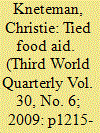

|
|
|
|
|
| Publication |
2009.
|
| Summary/Abstract |
'Tied' or 'in-kind' international food aid has been criticised as an implicit form of export subsidy that governments use to circumvent export subsidy restrictions. In addition to displacing agricultural exports, food aid is less efficient than untied aid and depresses local agricultural production in recipient countries. I argue that tied food aid is not protected by the Uruguay Round Agreement on Agriculture and could consequently be challenged under the World Trade Organization's dispute settlement mechanism as a prohibited or actionable subsidy contrary to the Subsidies and Countervailing Measures (scm) Agreement. As the USA is both the largest donor of international food aid and most consistently ties its food aid to domestic agricultural producers, this paper focuses on US policy to describe the challenge that might be advanced under the scm Agreement.
|
|
|
|
|
|
|
|
|
|
|
|
|
|
|
|
|
|
|
|
|